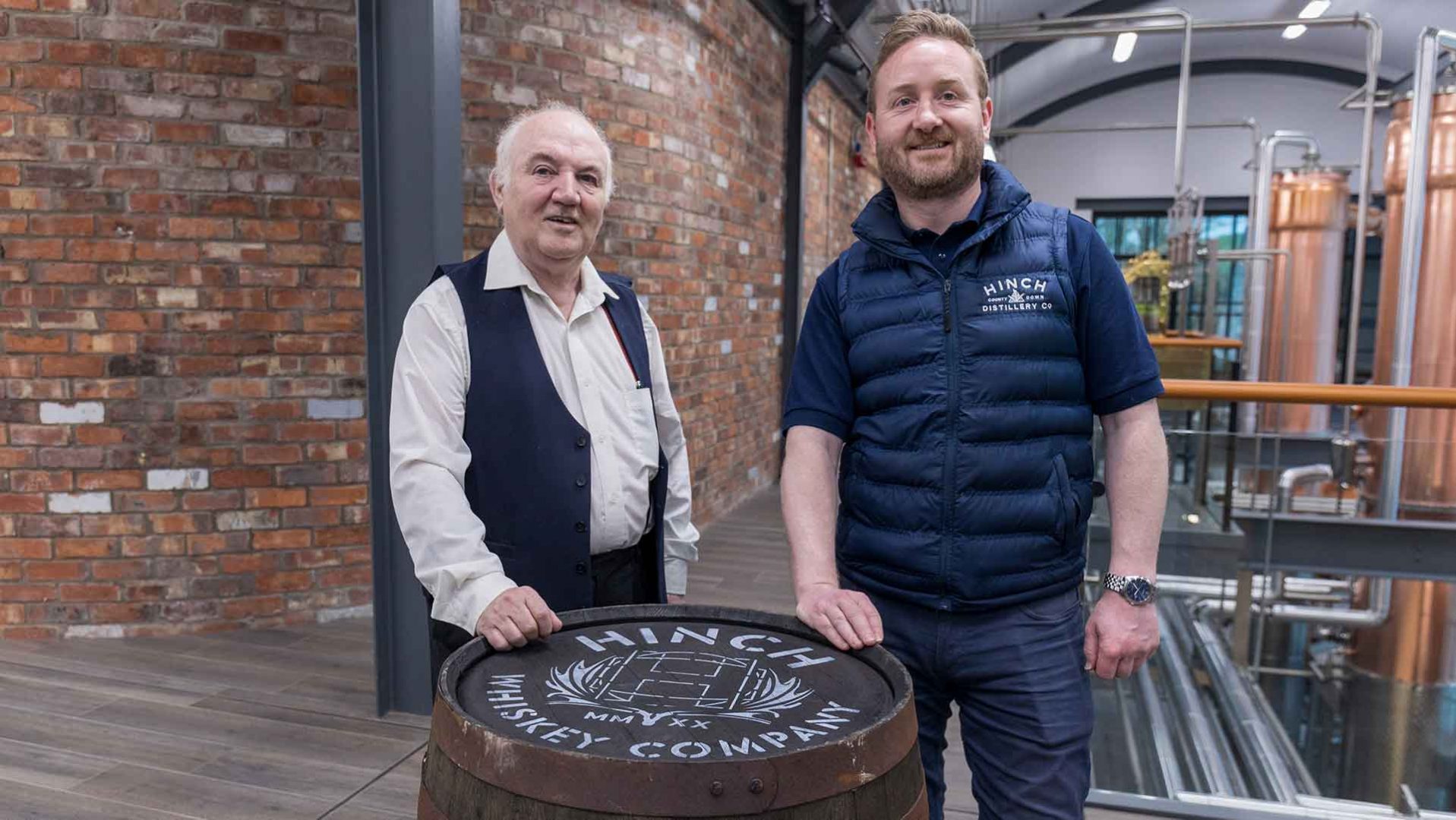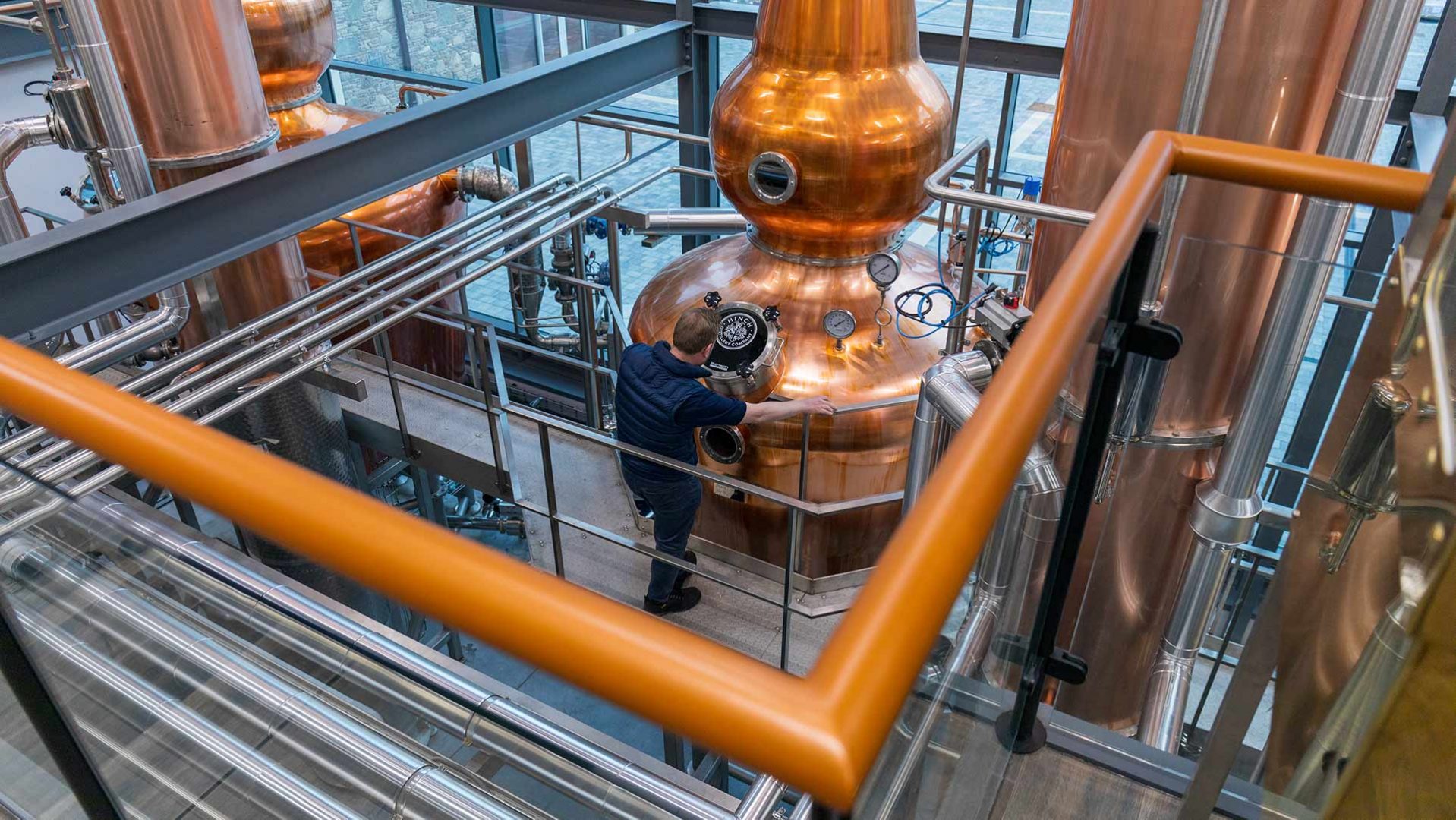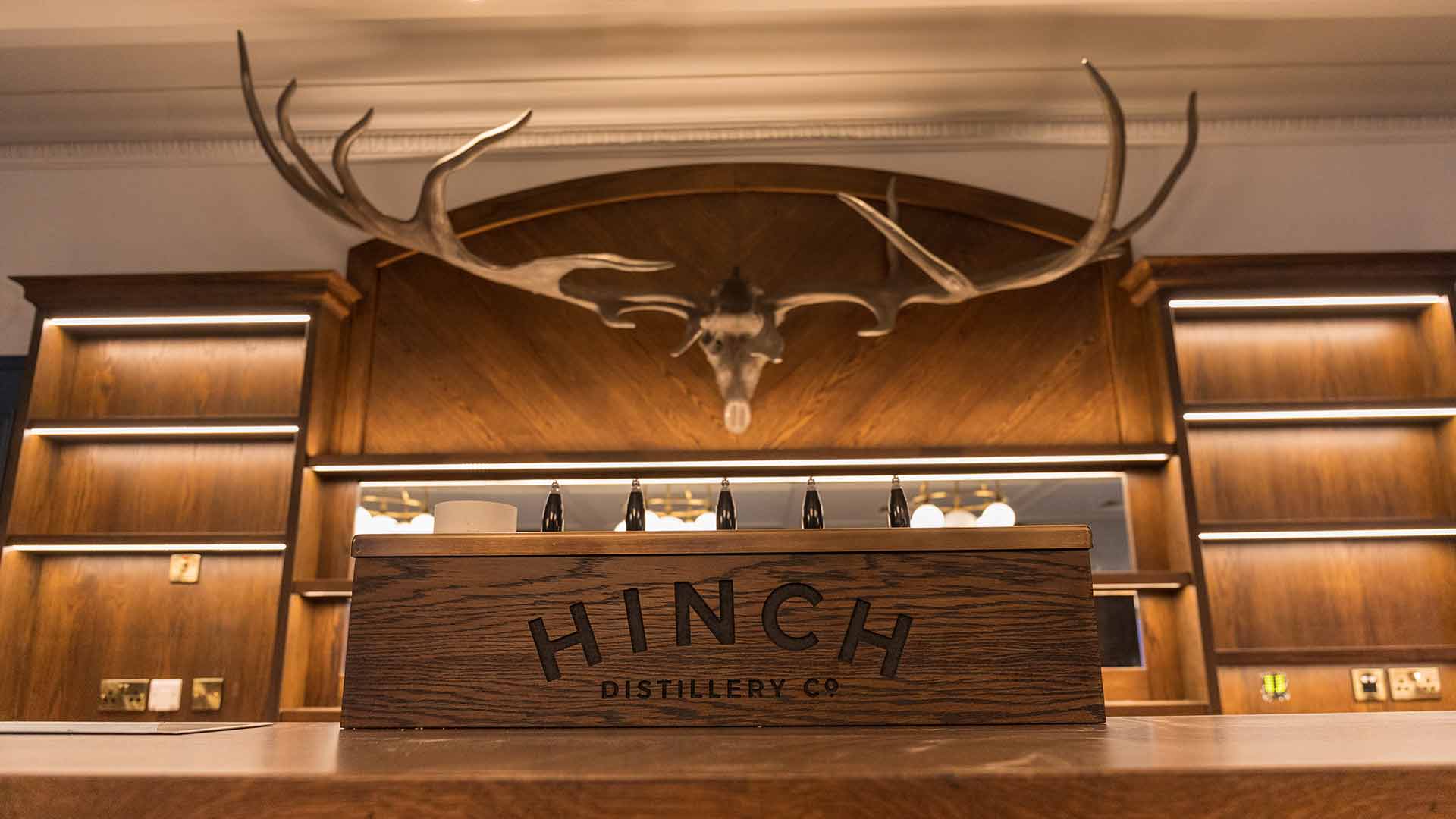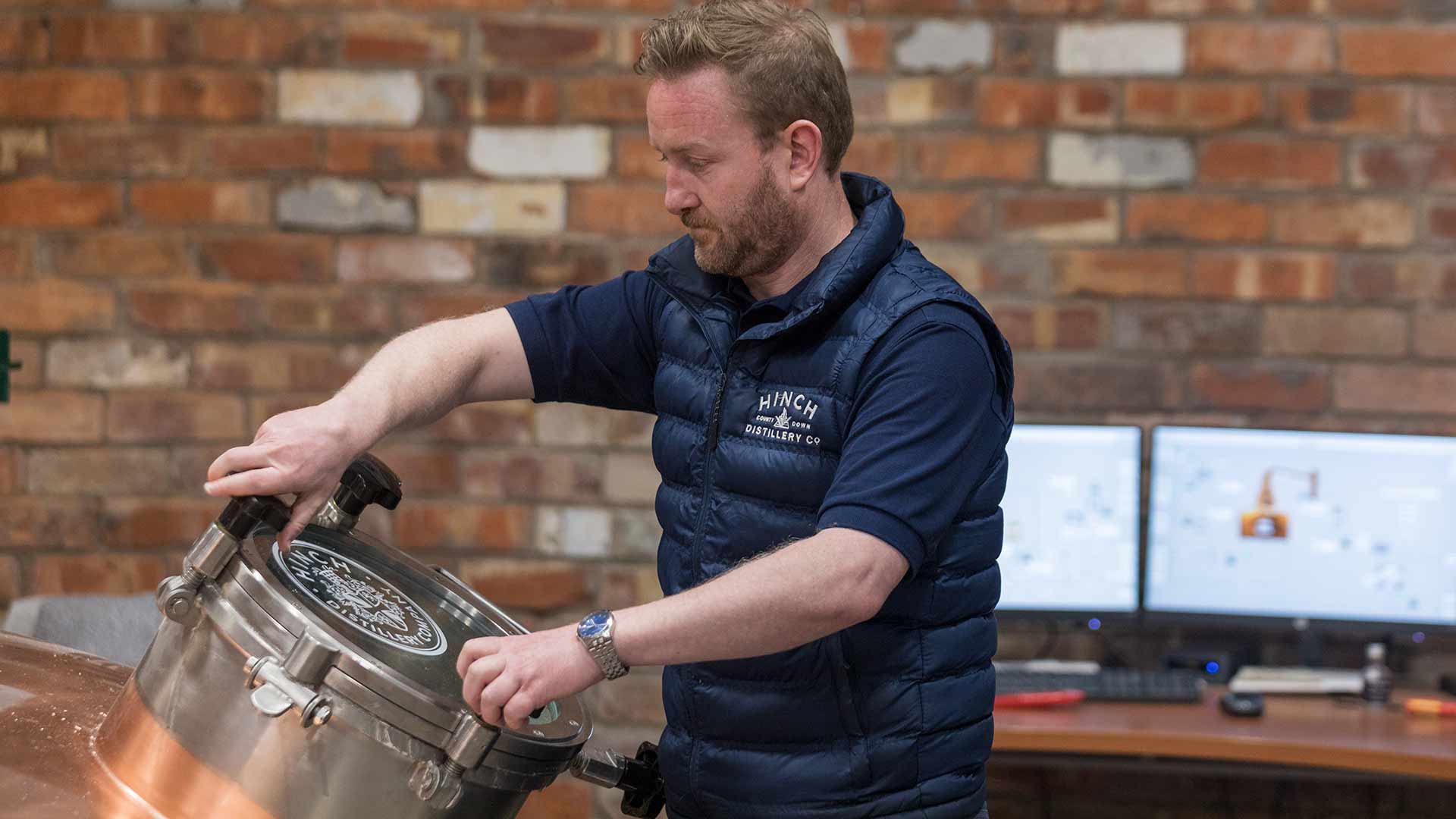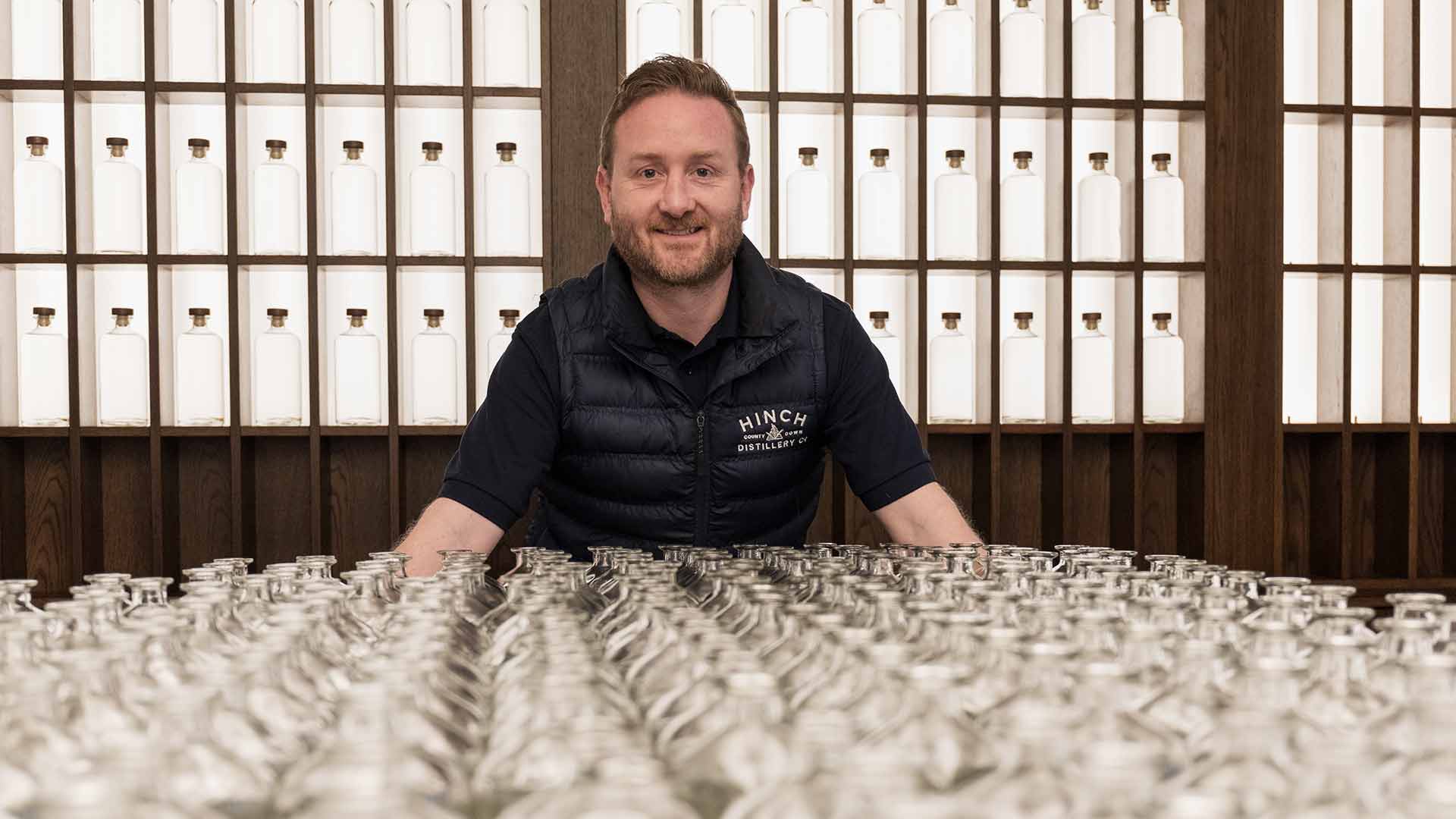“Give an Irishman lager for a month, and he’s a dead man. An Irishman is lined with copper, and the beer corrodes it. But whiskey polishes the copper and is the saving of him.”
Mark Twain
We caught up with Aaron Flaherty, Head Distiller of Belfast’s newest distillery. Most major cities on this island – and a few places ‘off the beaten path’ – are steeped in whiskey tradition. Dublin has Jameson, Cork has Midleton, and Bushmills has, well, Bushmills. In recent years, craft distilleries have been popping up in every corner of the island and making names for themselves. Names like Teeling, Connemara, The Quiet Man and Killowen have very quickly become household names – and items – for whiskey lovers across Ireland. So, the question is, why doesn’t Belfast have a big, bad, bold distillery of its own? Luckily, through the fine work of Aaron and his staff, we won’t be left pondering that question for much longer.
Hinch Distillery was founded in 2020 by Belfast-born businessman, Dr Terry Cross OBE, on the beautiful grounds of Ballynahinch’s Killaney Estate. Terry – one of NI’s most successful entrepreneurs – also happens to own Bordeaux’s Château de La Ligne and is expanding its repertoire from French grapes to malted barley. After speaking with his Head Distiller, we have no doubt that Northern Ireland’s capital – whose reputation used to ‘Hinch’ on Harp Lager – will fast become an integral part of the grand mosaic that is whiskey-making in this part of the world.
That is, if there is anything left of the stuff after our visit! Here’s what Aaron had to say:
How did you get into whiskey?
I’m local – Dundonald, County Down born and raised. After a rugby trip to New Zealand in school, I just knew I had to go abroad and see different things, so I made the big jump and headed to the far shores of Scotland. I ended up studying at Strathclyde University in Glasgow and pursued chemical engineering. The typical route for chemical engineers is towards oil and gas, so naturally, I ended up in whiskey. A friend of mine who was working for the Diageo Beverage Company said, “Hey, you might enjoy it here.” I applied and got into their graduate programme.
My first placement was in Elgin, way up north in what might as well be Scandinavia. That’s when I was introduced to my first malt distillery and I’ve never looked back – I was in my element.
Where else have you worked?
Diageo sent me around the world. I worked in various malt distilling sites in Scotland, including in Islay at Lagavulin and Caol Isla, then up to the far north at Clynelish. I also enjoyed the opportunity to work back at home at Bushmills. I then had the once-in-a-lifetime experience of working in beer brewing in Cameroon and Ethiopia, later being transferred back to work at the Phoenix Project expansion for Guinness at St James Gate in Dublin and, finally, at Belfast’s small pack packaging plant.
At different times and many different places, I’ve worked in grains, warehousing, as well as in the disgorging and blending of whiskeys. I was able to build a well-rounded CV quite quickly.
My heart always remained in malting. The aroma was just too enticing. When you walk into a malt distillery and you see the copper stills, you get those smells that just can’t be duplicated elsewhere.
How did you become Head Distiller at Hinch?
A colleague of mine saw the job opening here at Hinch and said, “That’s every job you’ve ever done in one!” So, I had to apply for it. I was already talking to different people about starting a local distillery, so the timing was impeccable. Now I’ve finally got my ‘playground’!
It’s a dream job. I love the fact that our Owner, Dr Terry Cross OBE, is so passionate about whiskey. He gives us free reign. He is completely open and encourages us to use our creativity and expertise.
Tell us about the distillery
Where we are now has been completely driven by Terry – it’s a credit to him. Opening a distillery is hard enough at the best of times. Our inaugural year is 2020 – we’ll never forget that. He would have been well within his rights to postpone but he didn’t. He spoke to us all very candidly about our thoughts and what we should do.
I think the collective attitude was, “Let’s go for it, Covid or not.” Given the level of investment needed to get this place off the ground, it was a tremendous vote of confidence giving us the go-ahead to continue. He deserves all the credit.
We’ve got a great team in here that are all really passionate about whiskey and proud to bring a successful distillery to greater Belfast. When you’ve got an owner who is passionate and colleagues who share those sentiments, it’s a great environment to work in.
Are you a modernist or traditionalist?
I’m all about tradition. I always say, our ancestors have been doing this for hundreds of years before us successfully – our job is to not screw it up. Let’s focus on the core of what whiskey is while entertaining what we can do to enhance it in new and exciting ways. You don’t have to be going out and finding random casks to make your whiskey innovative – though I’m certainly not against this idea either. Now that there are more distilleries, you’ll start to see more funky stuff happening. We’ll start seeing more of a ‘whiskey wheel’ of flavours beyond the light, fruity spirits we’re used to. We’ll start seeing profiles that are nutty, spicy and even meaty going forward. We very much welcome this, but tradition is to be respected and even emboldened through this process.
What are some of the experimental things you are doing?
We’ve already started to experiment with different types of casking. As previously mentioned, Terry owns his own winery in Bordeaux, France. 2020 was the first year he was able to use the title, ‘Grand Reserve’, for one of his wines. Immediately, I said, “We have to see what our whiskey does in those barrels!”
Is there not an element of risk in this sort of experimentation?
Certainly. We added 18-year-old single malt into one of those wine barrels. It was petrifying risking that high quality of a whiskey. My heart was in my mouth! I let it lie for six to eight weeks before I went down to sample it! As soon as I took it to my nose, though, I could tell we had something special. It had a lovely red, fresh fruit on it – like red liquorice. The grape they’re using in Bordeaux stands up to the whiskey without overpowering it.
At the end of it, 650 bottles were produced and we created a limited-edition box containing the single malt and the wine.
Have you collaborated with other local producers?
We have done a few experiments with local breweries. We used Kinnegar and Whitewater beers to age in some of our empty whiskey casks. Whitewater had a Russian Imperial Stout called Kreme de la Kremlin. They took some of our ex-bourbon casks and filled them with the stout. After they were disgorged, we took the casks back and refilled it with our whiskey. I’m telling you, the flavour that came off it was just unbelievable – chocolatey, coffee, dark toffee. It’s dessert in liquid form!
Irish vs Scotch Whisk(e)y
Traditionally, most Irish whiskeys are of the same flavour profile. Though it’s some of the greatest stuff around, we haven’t had the same diversity of flavours you’ll find historically in Scotch or bourbons.
Scotch has the entire range of flavours available. Take Islay for example. If you were just going to ‘paint them with one brush’, you’d say, “Oh, they’re all ‘peated’.” And while that’s true, the diversity within that is exceptional. Some of their whiskies are of that medicinal profile, which is great because I’ve always argued the medicinal effects of whisky anyways. Others are literally liquid bonfires. I got my start in Scotland, you see, and I have tremendous respect for what they do over there. I want Ireland to offer the same quality and range.
Single Malt vs Pot Still
I’m a big single malt man. I totally respect pot still and we’re set up for success in that regard. But I really want Hinch to be known for big-bodied, full of character single malts. It would be great for this island to have something that can rival Scotland – and why can’t we?! We, of course, will have blends and get creative with the different casks, but single malts will be our signature.
Where would you like to see Hinch in the future?
One of the common questions we get is, “How can you be selling whiskey if you’re only just open?”
We are very transparent here. We have sourced high quality malt and grain and we’re putting that out there in the short term, while working with proven partners as the rest of our whiskey ages. It’s very easy to level new distilleries by saying, “Oh, the spirit’s not old enough.” Now, we could sit and wait for 10 years before making a release, but where’s the fun in that? If we’re doing the right things in the mashing, distillation and operational processes, what would stop us from putting out a top-notch spirit now? So, that’s our focus for our first five years.
What else do you have planned?
Once we get past the five-year mark, we’ll just continue on with what we’re doing – continuing our single malts, creating older-aged, different varieties and getting more creative with our blends. I want our customers, who have supported us from the very beginning, to come out of that first tasting with big grins on their faces and a twinkle in their eyes from the whiskey they’ve consumed. We want to create a big, bold, Belfast distillery churning out world-class whiskeys that can rival anyone and anywhere in the world.
And what about Gin?
Our gin is called Ninth Wave. Ninth Wave is a traditional London Dry Gin distilled in traditional Irish ways. You’ll get your junipers, your cardamom and all the usual suspects, but you’ll also get a bit of citrus, spice and fruitiness with it.
Thoughts on the Irish whiskey industry
Some people are worrying we’ll have too many distilleries – is that a thing?! We’re only getting started. Bring on the ‘Irish whiskey revolution’!
Most of my experience in whisk(e)y has been spent in Scotland. There was some cask trading in Scotland, but you wouldn’t be on the phone to other distilleries and asking them for help very often. It’s just not done.
What’s great about Ireland is that there is a real sense of community in the whiskey trade. Fellow distilleries will go above and beyond the call to help you. We are very proud to be part of that and building on that great sense of tradition while having the craic with other passionate whiskey lovers.
We’ve had great support from other local distilleries and we’re looking forward to reciprocating these good graces once we’re completely up and running.
You want to bring peat back to Irish whiskey?
I’m especially excited to start our young ‘peated’ line. Outside of Connemara, you don’t really see ‘peated’ whiskey anywhere else on the island. People say, “It’s not traditionally Irish.” In Scotland and Ireland, if you go back to the days before coal, they needed a fuel source to make whisk(e)y. What was available? Peat!
I would question that peat was even seen as a ‘flavour’ in those days. I would surmise that at one point every whisk(e)y in Ireland and Scotland was ‘peated’. And that’s why Islay and various islands off Scotland’s west coast have remained peated, as they didn’t have the same access to other fuels. I don’t buy into the fact that peat shouldn’t be an integral ingredient of Irish whiskey.
The way I see it, the Irish Sea shouldn’t serve as a divide to our traditions, but as a conduit. We can and should produce world class single malts here – peated or not. No one is stopping us!
Will you have visitors here after Covid?
There’s going to be a number of things available. We’ll have tours and there’s going to be a bar and restaurant. There will be function spaces, which will cater to parties and weddings. There will also be corporate spaces for special events.
We want to create a very informative, fun, and interactive experience for visitors. We don’t want to take visitors on a boring 60-minute walking tour. Most people – unless they’re complete nerds like me – lose interest. Most importantly, we’ll have an exclusive tasting room at the end of the tour where you can try everything we offer.
The main bar and restaurant will feature all our products and others, with a menu that complements our spirits. We’ll do food pairings and the like.
Just as a friendly warning, if you’re going to join us for a corporate day away, we suggest having your working session in the morning and then hop on the whiskey in the afternoon to ensure proper productivity and workplace etiquette.
On the Irish ‘Whiskey Revolution’
There is a new wave of whiskey drinkers – you’re seeing young people getting into it. ‘Twenty-somethings’, male and female, are all loving it. It’s a different world. It used to be just an old man and his pipe – times are changing!
But this ‘whiskey revolution’ isn’t just happening because it’s cool – it’s because there’s some really innovative folk making revolutionary spirits. Whiskey is like wine – everyone hates it at first, but they slowly open themselves up to it and discover a whole new world. Good whiskey is about getting all your senses going.
Questions for the Future
As Irish whiskey producers, what is it that we want to see? For me, it’s about ensuring whiskey is the drink of choice for this next generation by restoring it to where it should have always been.
Why can’t we have different ‘whiskey regions’ like Scotland does? I’d love to be here in twenty years’ time and talking about the ‘region-ality’ of whiskey – discussing and debating what each wee corner of the island has to offer.
With Scotch, their journey has already taken place – their whisky heritage is solidified. Ours is still to be formed, but what’s great about that is we can make it whatever we want it to be now.
What does success look like to you?
Success for us is, in 100 years’ time, this building is still here, making revolutionary whiskey.
